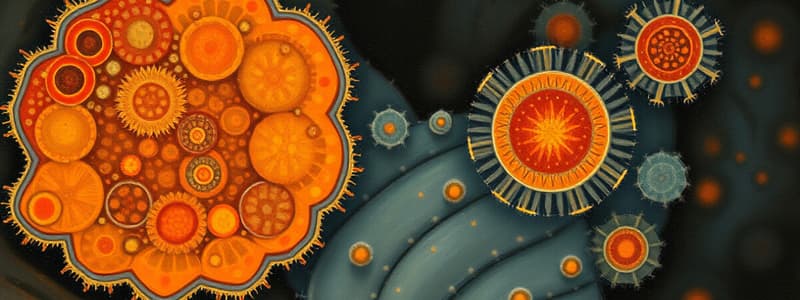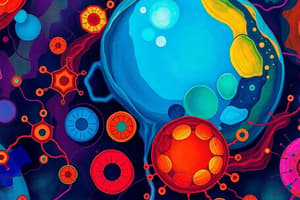Podcast
Questions and Answers
What is one of the main functions of the Rough Endoplasmic Reticulum?
What is one of the main functions of the Rough Endoplasmic Reticulum?
- Generating energy through ATP production
- Digestion of cellular waste
- Photosynthesis in plant cells
- Protein synthesis and trafficking (correct)
Which of the following statements is true about lysosomes?
Which of the following statements is true about lysosomes?
- They are involved in energy production.
- They facilitate protein synthesis.
- They are found in both animal and plant cells.
- They play a role in digesting food and recycling cellular components. (correct)
What role do mitochondria play in cellular health?
What role do mitochondria play in cellular health?
- They are responsible for cellular digestion.
- They are involved mainly in protein synthesis.
- They act as the powerhouse of the cell, providing energy. (correct)
- They serve as the main site for photosynthesis.
Which statement accurately reflects the function of chloroplasts in plant cells?
Which statement accurately reflects the function of chloroplasts in plant cells?
What distinguishes plant cells from animal cells regarding cellular components?
What distinguishes plant cells from animal cells regarding cellular components?
What is one of the key concepts of the cell theory?
What is one of the key concepts of the cell theory?
Which of the following statements best describes prokaryotic cells?
Which of the following statements best describes prokaryotic cells?
How many different cell types are approximately found in mammals?
How many different cell types are approximately found in mammals?
What is the estimated width of an average cell?
What is the estimated width of an average cell?
What role does the nucleus play in a cell?
What role does the nucleus play in a cell?
Flashcards are hidden until you start studying
Study Notes
Importance of Cell Biology
- Understanding cell biology is essential for solving biological problems, as all living organisms derive from cells, as emphasized by E.B. Wilson in 1925.
Cellular Composition
- A human body consists of approximately 100 trillion cells (1 x 10^14).
- Around 200 different cell types exist in mammals.
- Average cell size is 0.002 cm (20 µm), equating to about 1250 cells per inch.
Cell Theory
- Formulated in 1838 and 1839, the cell theory is a foundational principle of biology.
- Key tenets include:
- All organisms are made of one or more cells.
- Cells are the smallest living units.
- New cells arise from existing cells.
- All present-day organisms descend from ancestral cells.
Types of Cells
- Two basic cell types exist: prokaryotic and eukaryotic.
- Eukaryotic cells encompass various organelles, as depicted in idealized representations.
Cellular Anatomy
- The nucleus serves as the control center of the cell, encompassing two meters of DNA within a remarkably small structure (0.000005 meters across).
- Rough Endoplasmic Reticulum (RER) is crucial for:
- Protein synthesis, accounting for about half of the cell’s proteins.
- Protein movement and quality control (proofreading).
Lysosomes
- Function to:
- Digest food and eliminate cellular invaders.
- Recycle cellular components and manage programmed cell death (apoptosis).
- Lysosomes are absent in plant cells and are linked to various diseases when malfunctioning.
Mitochondria
- Referred to as the cell's powerhouse, both plant and animal cells contain numerous mitochondria.
- Malfunctioning mitochondria can lead to muscle weakness, neurological disorders, and are associated with aging.
Chloroplasts
- Exclusive to plant cells, chloroplasts function as solar panels, capturing light energy for photosynthesis.
- The central vacuole can occupy up to 90% of a plant cell's volume, highlighting the structural differences from animal cells.
Studying That Suits You
Use AI to generate personalized quizzes and flashcards to suit your learning preferences.




